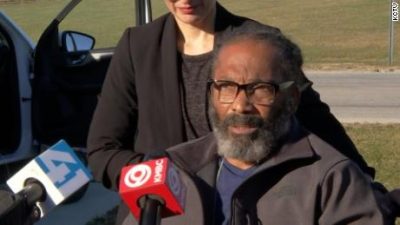Man to be freed after spending 43 years in prison for triple murder he didn’t commit

After spending 43 years behind bars for a crime he said he didn’t commit, a Missouri man’s conviction has been set aside, according to a news release from Jackson County Prosecutor Jean Peters Baker.
Senior Judge James Welsh filed his ruling Tuesday morning to set aside the conviction of 62-year-old Kevin Strickland, who served 43 years at Western Missouri Correctional Center in Cameron, Missouri, after he was convicted of one count of capital murder and two counts of second-degree murder in a triple homicide. He received a 50-year life sentence without the possibility for parole for a crime he maintained he wasn’t involved in.
Strickland, from a wheelchair, spoke shortly after he was released from jail Tuesday afternoon and said he’s thankful for his attorneys and everyone who listened to him over the years while he maintained his innocence.
All criminal counts against Strickland were dismissed. His release makes his confinement the longest wrongful imprisonment in Missouri history and one of the longest in the nation, according to The National Registry of Exonerations.
“Still in disbelief,” Strickland said. “I didn’t think this day would come.”
Strickland said he found out the news of his release through a breaking news report that interrupted the soap opera he was watching.
“To say we’re extremely pleased and grateful is an understatement,” Peters Baker said. “This brings justice — finally — to a man who has tragically suffered so, so greatly as a result of this wrongful conviction.”
Strickland testified during a three-day evidentiary hearing earlier this month — which involved eyewitness testimony given under oath — Strickland’s legal team presented evidence and arguments to exonerate him.
Four people were shot in Kansas City, Missouri, on April 25, 1978, resulting in three deaths, according to CNN affiliate KSHB. The only survivor of the crime, Cynthia Douglas, who died in 2015, testified in 1978 Strickland was at the scene of the triple murder.
Douglas survived the shooting after sustaining a shotgun injury and told police Vincent Bell and Kiln Adkins were two of the perpetrators. But she did not identify Strickland, who she knew, at the scene until a day later, according to KSHB, after it was suggested to her Strickland’s hair matched Douglas’ description of the shooter. Douglas claimed her initial failure to identify him was due to the use of cognac and marijuana, according to KSHB.
But over the past 30 years she said she made a mistake and falsely identified Strickland. According to KSHB, Douglas made efforts to free Strickland through the Midwest Innocence Project.
The two assailants Douglas identified at the scene both pleaded guilty to second-degree murder and each ended up serving about 10 years in prison for the crimes, according to Strickland’s attorney, Robert Hoffman.
“Most of us have heard the famous quotation that ‘injustice anywhere is a threat to justice everywhere,'” Peters Baker said in an online statement posted in August. “Kevin Strickland stands as our own example of what happens when a system set to be just, just gets it terribly wrong.”
Strickland thanked the judge for reviewing all the “non evidence” against him and he appreciated the judge taking his time to listen and understand what really happened in 1978.
Eventually Strickland said he wants to get involved in speaking and possibly influencing legislation, and added he has ideas on how to keep this from happening to someone else.
A GoFundMe account has been set up by the Midwest Innocence Project to help him restart his life. They note the State of Missouri will provide no compensation for the time he spent in prison.
In 2020, there were 129 exonerations nationwide. Defendants exonerated last year lost a total of 1,737 years behind bars, an average of 13.4 years per exoneration, according to a report from The National Registry of Exonerations. And 30% of wrongful convictions in the registry’s database can be traced back to mistaken eyewitness identifications.
(Courtesy CNN)

